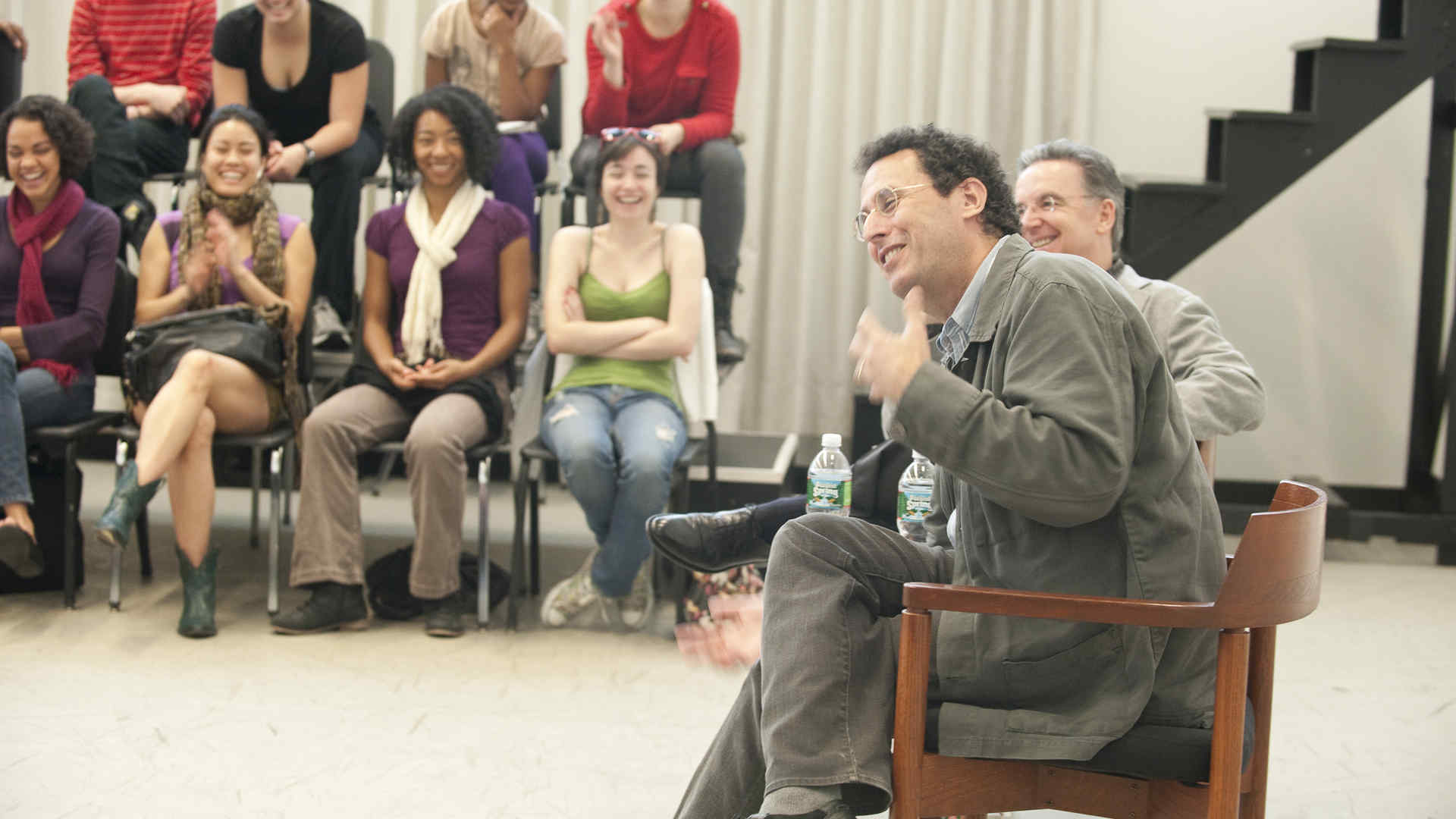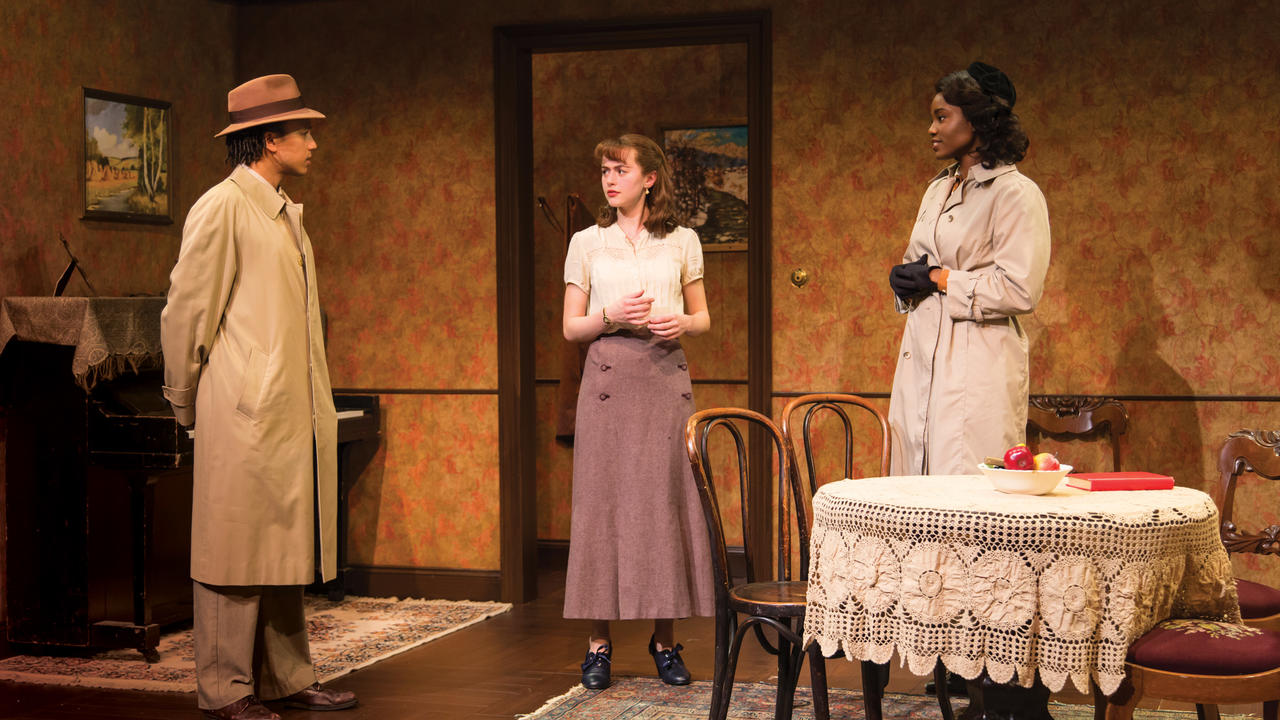
This fall, the third-year actors performed Tony Kushner’s first play, A Bright Room Called Day (1985). Afterward, one of the actors, Hayward Leach, interviewed the playwright. Twenty-seven years earlier, Kushner had spent 1991-92 at Juilliard as a playwright in residence (the program was a forerunner of today’s Lila Acheson Wallace American Playwrights Program).
Tony Kushner’s volubility speaks before him. Journalists marvel at his barrage of words, his quicksilver mind. What is less noted is the warmth, generosity, and curiosity, the engine of basic goodness that churns the conversation forward and beyond expected time limits.
Kushner, one of the best-known playwrights in America, has been at Juilliard numerous times over the years, starting in the 1991-92 school year, when he was a playwright in residence. That spring, Millennium Approaches, Part I of Kushner’s Angels in America (which went on to phenomenal success) made its debut as a Juilliard fourth-year production. Most recently, Kushner was here this fall when the third-year actors workshopped his first play, A Bright Room Called Day. Bright Room follows the journey of five artists in 1932 Berlin contending with the rise of fascism and their own inertia in the face of evil. Two characters, Zillah and Xillah, comment on the action: one from 1985 and the other from the present. Kushner wrote Bright Room in 1984-85 in reaction to the reelection of Ronald Reagan and the alarming wave of conservatism in America and had been working on a new version last year. When Richard Feldman, associate artistic director of the Drama Division, reached out about doing it here, Kushner jumped at the chance. I had the pleasure of sharing an hour on the phone with him not long after Bright Room closed, and what follows is an edited version of the conversation.
Hayward Leach: What was it like to walk through these doors again?
Tony Kushner: When I was at Juilliard the last time I had these two experiences. One was really, really great, which was Richard’s production of Millennium Approaches. It was the first time anybody in New York saw the play, and it was with Michael Stuhlbarg and Beth Marvel and Enid Graham and Robby Sella, Michael Hayden—this wonderful company and that was really great. But I also had this really tough experience with the third-year class. For various reasons it didn’t work out—it should have, but it didn’t—and these two things were happening right on top of another, so it was a weird time.
Why did you choose to work the play with students?
Many of the actors I work with today are actors that I met as acting students. It’s fun being around people who are starting out. Sometimes you come across in professional circumstances people who are really a little bit done. It would be scary to find that among students in an acting school. If you’re already tired of acting, you probably shouldn’t be in school. [Teaching] reconnects you with people who are discovering stuff and who are still very excited about it.
How do you maintain your creativity?
Writing has always been such a struggle for me; in fact it’s now a struggle in some ways that it wasn’t when I was 26, when I wrote Bright Room. There are times when I feel, “Haven’t I already written this scene? Isn’t it just scene that I wrote in this play or in that screenplay?” And there’s always the fear—it’s one of the things that slows me down—that if I’m not careful I’ll just default to whatever I’ve done, finding a way of disguising it, but it will sort of be the same gesture.
Of course any writer, even Shakespeare or Chekhov, repeats—their work is recognizably by the same person. But you don’t want to just find new ways of doing the same old shit because that’s the way to really kill it. The one thing I may be most pleased with myself about as a writer is, when Angels was opening on Broadway, my father called me and said he had just watched a documentary [in which someone asked] David Lean, the film director, “What’s the secret for having a long career?” And he said, “Something I learned in the army: never stick your head up out of the same foxhole twice.” I think that that’s good advice. If you offer an actor a really great part but they’ve just done pretty much something exactly like it, some actors will say “sure,” but others will just say, “I can’t do that again, I have to do something new.” The great thing about playwriting, and acting, is that we get to be little dilettante experts—you have to be a curious person and a person with an appetite for learning. Most of us enjoy gaining a little bit of expertise for a little bit of time about something.

I understand you’re now working on a play about the political rise of Trump?
In a certain sense, pretty much everything I’ve written is about the rise of Trump, because the rise of Trump is on the backs of Reagan and the two Bushes and the whole disastrous history of the Republican party for the last 60 years. Trump himself, I’ve said this before, doesn’t really interest me, I mean, that’s one of the horrors of this moment is that he’s so fucking boring, I mean he shocks you over and over again, but being shocked is not necessarily interesting. Shock is sticking your tongue into an electric socket. It’s not a pleasant feeling and it will make your adrenaline glands overreact, but that’s not the same thing as being interesting, it’s just a sensation.
What makes us interesting as dramatic characters is that we are all compounded with contradiction. Each of us individually is bred to have an adherence to—or we choose an adherence to—certain themes, certain issues, certain questions, and our contradictions spin around those. That’s what makes a person interesting and somebody that you can dig into even if they’re very different than you. Donald Trump doesn’t have that, he shows us every day that the only thing that’s at the center of his being is this bottomless need to replace the emptiness within with a kind of magical love that no one on earth who’s an adult should ever need or expect. Who wants to watch that on stage? I’m not putting Trump on stage.
Actor Hayward Leach, a third-year MFA candidate, holds Shubert and Juilliard Theater scholarships